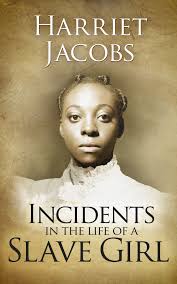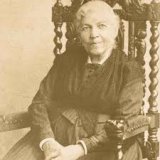Incidents in the Life of a Slave Girl Page #14
Incidents in the Life of a Slave Girl, written by herself is an autobiography by Harriet Jacobs, a mother and fugitive slave, published in 1861 by L. Maria Child, who edited the book for its author. Jacobs used the pseudonym Linda Brent.
This whole story was false. I afterwards staid with that friend in New York, and found her in comfortable circumstances. She had never thought of such a thing as wishing to go back to slavery. Many of the slaves believe such stories, and think it is not worth while to exchange slavery for such a hard kind of freedom. It is difficult to persuade such that freedom could make them useful men, and enable them to protect their wives and children. If those heathen in our Christian land had as much teaching as some Hindoos, they would think otherwise. They would know that liberty is more valuable than life. They would begin to understand their own capabilities, and exert themselves to become men and women. But while the Free States sustain a law which hurls fugitives back into slavery, how can the slaves resolve to become men? There are some who strive to protect wives and daughters from the insults of their masters; but those who have such sentiments have had advantages above the general mass of slaves. They have been partially civilized and Christianized by favorable circumstances. Some are bold enough to utter such sentiments to their masters. O, that there were more of them! Some poor creatures have been so brutalized by the lash that they will sneak out of the way to give their masters free access to their wives and daughters. Do you think this proves the black man to belong to an inferior order of beings? What would you be, if you had been born and brought up a slave, with generations of slaves for ancestors? I admit that the black man is inferior. But what is it that makes him so? It is the ignorance in which white men compel him to live; it is the torturing whip that lashes manhood out of him; it is the fierce bloodhounds of the South, and the scarcely less cruel human bloodhounds of the north, who enforce the Fugitive Slave Law. They do the work. Southern gentlemen indulge in the most contemptuous expressions about the Yankees, while they, on their part, consent to do the vilest work for them, such as the ferocious bloodhounds and the despised negro-hunters are employed to do at home. When southerners go to the north, they are proud to do them honor; but the northern man is not welcome south of Mason and Dixon's line, unless he suppresses every thought and feeling at variance with their "peculiar institution." Nor is it enough to be silent. The masters are not pleased, unless they obtain a greater degree of subservience than that; and they are generally accommodated. Do they respect the northerner for this? I trow not. Even the slaves despise "a northern man with southern principles;" and that is the class they generally see. When northerners go to the south to reside, they prove very apt scholars. They soon imbibe the sentiments and disposition of their neighbors, and generally go beyond their teachers. Of the two, they are proverbially the hardest masters. They seem to satisfy their consciences with the doctrine that God created the Africans to be slaves. What a libel upon the heavenly Father, who "made of one blood all nations of men!" And then who are Africans? Who can measure the amount of Anglo-Saxon blood coursing in the veins of American slaves? I have spoken of the pains slaveholders take to give their slaves a bad opinion of the north; but, notwithstanding this, intelligent slaves are aware that they have many friends in the Free States. Even the most ignorant have some confused notions about it. They knew that I could read; and I was often asked if I had seen any thing in the newspapers about white folks over in the big north, who were trying to get their freedom for them. Some believe that the abolitionists have already made them free, and that it is established by law, but that their masters prevent the law from going into effect. One woman begged me to get a newspaper and read it over. She said her husband told her that the black people had sent word to the queen of 'Merica that they were all slaves; that she didn't believe it, and went to Washington city to see the president about it. They quarrelled; she drew her sword upon him, and swore that he should help her to make them all free. That poor, ignorant woman thought that America was governed by a Queen, to whom the President was subordinate. I wish the President was subordinate to Queen Justice. IX. Sketches Of Neighboring Slaveholders. There was a planter in the country, not far from us, whom I will call Mr. Litch. He was an ill-bred, uneducated man, but very wealthy. He had six hundred slaves, many of whom he did not know by sight. His extensive plantation was managed by well-paid overseers. There was a jail and a whipping post on his grounds; and whatever cruelties were perpetrated there, they passed without comment. He was so effectually screened by his great wealth that he was called to no account for his crimes, not even for murder. Various were the punishments resorted to. A favorite one was to tie a rope round a man's body, and suspend him from the ground. A fire was kindled over him, from which was suspended a piece of fat pork. As this cooked, the scalding drops of fat continually fell on the bare flesh. On his own plantation, he required very strict obedience to the eighth commandment. But depredations on the neighbors were allowable, provided the culprit managed to evade detection or suspicion. If a neighbor brought a charge of theft against any of his slaves, he was browbeaten by the master, who assured him that his slaves had enough of every thing at home, and had no inducement to steal. No sooner was the neighbor's back turned, than the accused was sought out, and whipped for his lack of discretion. If a slave stole from him even a pound of meat or a peck of corn, if detection followed, he was put in chains and imprisoned, and so kept till his form was attentuated by hunger and suffering. A freshnet once bore his wine cellar and meat house miles away from the plantation. Some slaves followed, and secured bits of meat and bottles of wine. Two were detected; a ham and some liquor being found in their huts. They were summoned by their master. No words were used, but a club felled them to the ground. A rough box was their coffin, and their interment was a dog's burial. Nothing was said. Murder was so common on his plantation that he feared to be alone after nightfall. He might have believed in ghosts. His brother, if not equal in wealth, was at least equal in cruelty. His bloodhounds were well trained. Their pen was spacious, and a terror to the slaves. They were let loose on a runway, and, if they tracked him, they literally tore the flesh from his bones. When this slaveholder died, his shrieks and groans were so frightful that they appalled his own friends. His last words were, "I am going to hell; bury my money with me." After death his eyes remained open. To press the lids down, silver dollars were laid on them. These were buried with him. From this circumstance, a rumor went abroad that his coffin was filled with money. Three times his grave was opened, and his coffin taken out. The last time, his body was found on the ground, and a flock of buzzards were pecking at it. He was again interred, and a sentinel set over his grave. The perpetrators were never discovered.
Translation
Translate and read this book in other languages:
Select another language:
- - Select -
- 简体中文 (Chinese - Simplified)
- 繁體中文 (Chinese - Traditional)
- Español (Spanish)
- Esperanto (Esperanto)
- 日本語 (Japanese)
- Português (Portuguese)
- Deutsch (German)
- العربية (Arabic)
- Français (French)
- Русский (Russian)
- ಕನ್ನಡ (Kannada)
- 한국어 (Korean)
- עברית (Hebrew)
- Gaeilge (Irish)
- Українська (Ukrainian)
- اردو (Urdu)
- Magyar (Hungarian)
- मानक हिन्दी (Hindi)
- Indonesia (Indonesian)
- Italiano (Italian)
- தமிழ் (Tamil)
- Türkçe (Turkish)
- తెలుగు (Telugu)
- ภาษาไทย (Thai)
- Tiếng Việt (Vietnamese)
- Čeština (Czech)
- Polski (Polish)
- Bahasa Indonesia (Indonesian)
- Românește (Romanian)
- Nederlands (Dutch)
- Ελληνικά (Greek)
- Latinum (Latin)
- Svenska (Swedish)
- Dansk (Danish)
- Suomi (Finnish)
- فارسی (Persian)
- ייִדיש (Yiddish)
- հայերեն (Armenian)
- Norsk (Norwegian)
- English (English)
Citation
Use the citation below to add this book to your bibliography:
Style:MLAChicagoAPA
"Incidents in the Life of a Slave Girl Books." Literature.com. STANDS4 LLC, 2025. Web. 24 Feb. 2025. <https://www.literature.com/book/incidents_in_the_life_of_a_slave_girl_947>.








Discuss this Incidents in the Life of a Slave Girl book with the community:
Report Comment
We're doing our best to make sure our content is useful, accurate and safe.
If by any chance you spot an inappropriate comment while navigating through our website please use this form to let us know, and we'll take care of it shortly.
Attachment
You need to be logged in to favorite.
Log In